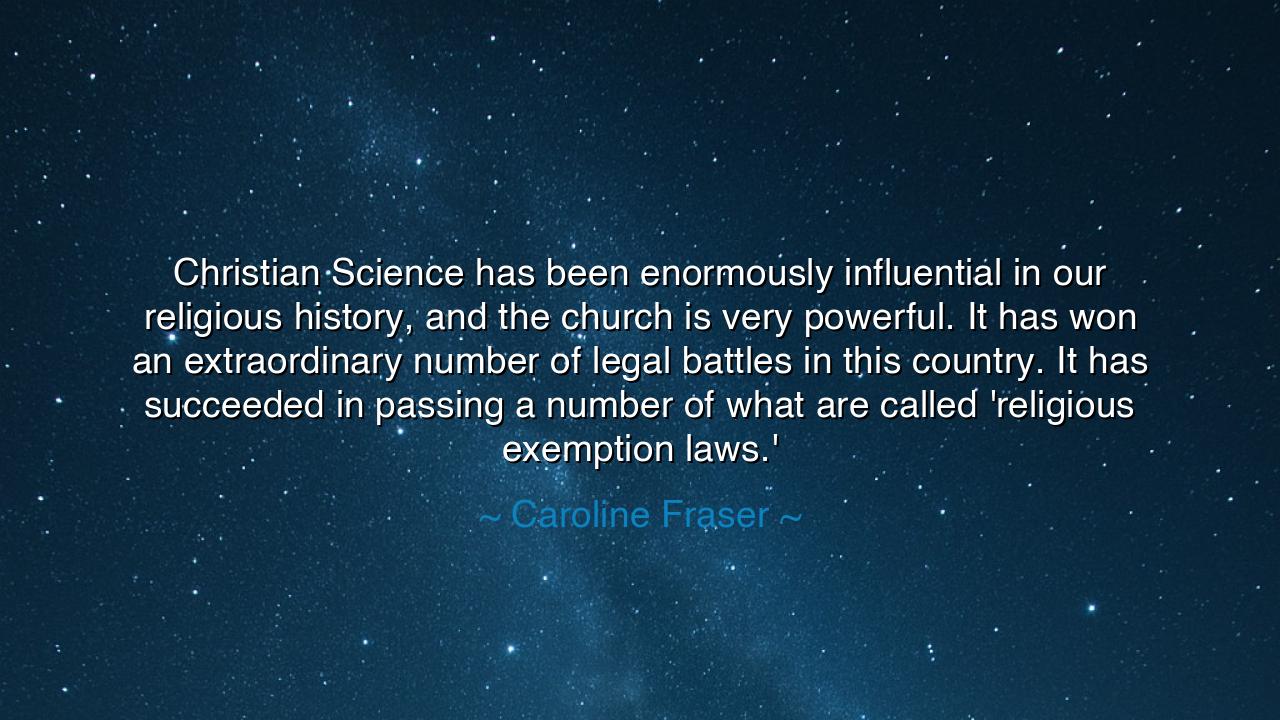
Christian Science has been enormously influential in our
Christian Science has been enormously influential in our religious history, and the church is very powerful. It has won an extraordinary number of legal battles in this country. It has succeeded in passing a number of what are called 'religious exemption laws.'






“Christian Science has been enormously influential in our religious history, and the church is very powerful. It has won an extraordinary number of legal battles in this country. It has succeeded in passing a number of what are called ‘religious exemption laws.’” Thus spoke Caroline Fraser, the historian and Pulitzer Prize–winning author who cast her gaze into the deep and sometimes shadowed waters of American faith. In this statement, she unveils not only the strength of a movement but the paradox of power in religion—how belief, when armed with influence, can reshape law itself. Her words carry the gravity of both awe and caution. For though Christian Science began as a quest for spiritual healing and enlightenment, its triumphs in court and politics reveal the enduring tension between faith and governance, between the liberty to believe and the duty to protect.
Caroline Fraser, who wrote God’s Perfect Child: Living and Dying in the Christian Science Church, is no stranger to the complexities of this faith. She herself was raised within its doctrines and later became one of its most eloquent chroniclers and critics. Her statement reflects both her intimacy with the church and her deep understanding of American religious liberty. Christian Science, founded by Mary Baker Eddy in the late 19th century, emerged in an age of spiritual experimentation and skepticism of materialism. It taught that illness could be overcome through prayer and the understanding of divine truth, rejecting conventional medicine as a symptom of misplaced faith. What began as a movement of personal conviction, however, grew into an institution of immense influence—one capable of shaping not only minds and hearts, but laws themselves.
Fraser’s words highlight the legal victories that the church has achieved throughout American history—battles fought not with sword or fire, but in the courts of democracy. Through religious exemption laws, Christian Scientists secured the right to refuse medical treatment for themselves and, controversially, for their children, choosing instead to rely upon spiritual healing. These victories stand as both testament and trial. For they reveal the strength of America’s devotion to freedom of religion, yet they also test the limits of that freedom when belief and life itself come into conflict. Thus, when Fraser calls the church “very powerful,” she is not merely describing political might; she is invoking the ancient question that haunts all civilizations: How far should belief reach into the realm of law?
In the chronicles of history, such struggles are not new. In the days of ancient Rome, emperors wrestled with how to govern a people of many gods. When Constantine embraced Christianity, the empire faced the same dilemma reversed—how to balance divine command with civil order. The lesson of those ages is clear: when faith becomes a force in law, it shapes nations for generations. And so it has been with Christian Science. In some states, laws protecting the church’s practices have remained for decades, shielding it from prosecution even in cases where the refusal of medical care led to tragedy. Fraser, in her measured tone, acknowledges this with both respect for the movement’s determination and sorrow for the suffering it sometimes wrought.
Consider the story of a child, frail with illness, whose parents, in faith, chose prayer over medicine. Their conviction was pure; their intention, love. Yet when the child passed, the courts were torn between compassion for belief and responsibility to protect the innocent. It is in such cases that the essence of Fraser’s observation burns brightest: the extraordinary legal power of a faith that began with healing had become entwined with the machinery of law itself. This power, she reminds us, is not inherently evil—but it is perilous when unchecked, for law must balance not only freedom but also the sanctity of life.
Her statement also carries a broader message about influence and accountability. Whether religious, political, or cultural, every movement that gains power must ask itself the question the ancients asked of kings: To what end do we rule? For belief, when granted exemption, must bear the weight of responsibility. Fraser’s insight urges us to see beyond reverence or condemnation—to understand that the true measure of a faith lies not only in its victories but in its mercy. The ability to shape law is a sacred trust, one that must be wielded with humility, lest devotion become dominance.
The lesson, then, is as timeless as it is necessary: power in the name of faith must serve compassion, not control. Let every generation remember that the strength of a religion lies not in the number of its laws, but in the purity of its love. Freedom of belief is among humanity’s highest gifts, but it must walk hand in hand with justice and care for the vulnerable. We must defend the right to believe—but also the right to be protected from belief’s misuse.
So remember, children of wisdom, the counsel of Caroline Fraser. The story of Christian Science is not merely that of a church, but of a nation learning, again and again, how to balance faith with fairness. Cherish your freedom to worship, but do not let it blind you to the lives it touches. For every law carved in defense of belief must also uphold the dignity of life. And when faith and law stand in harmony—each honoring the other—then, and only then, does true justice reign.






AAdministratorAdministrator
Welcome, honored guests. Please leave a comment, we will respond soon